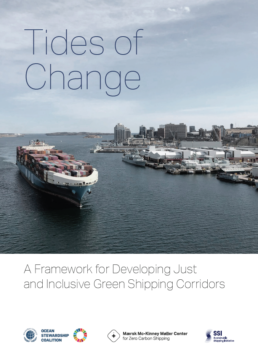Transitioning away from fossil fuels must include careful effort to avoid perpetuating the injustices present in today’s global economy, and instead ensure a just and equitable transition. A new report “Tides of Change: A Framework for Developing Just and Inclusive Maritime Green Corridors” co-created by the UN Global Compact, the Mærsk Mc-Kinney Møller Center for Zero Carbon Shipping, and the Sustainable Shipping Initiative outlines the necessary considerations and actions required from companies and governments involved in establishing green shipping corridors around the world.
Recommendations made in the report for a just and equitable transition towards net zero include:
- Ensuring green corridors leverage wider transition aims regionally/locally including improved access to clean energy, the development of decent, sustainable jobs, a diverse and inclusive workforce and capacity building but also improved air quality and preservation of biodiversity and ecosystems regionally.
- Creating decent, sustainable jobs and workforce up-skilling. In the process of establishing green corridors, stakeholders can test and demonstrate how to conduct inclusive social dialogue with affected groups.
- Advocating for strengthening institutional and regulatory frameworks that promote inclusion and protection of the most affected stakeholders.
This report describes what the stakeholders involved in green corridors project consortia must consider in order to contribute to a just transition. It is evident that this requires significant collective action, but also that the benefits of this approach will spread far beyond the shipping industry benefiting individuals, communities, and countries.

